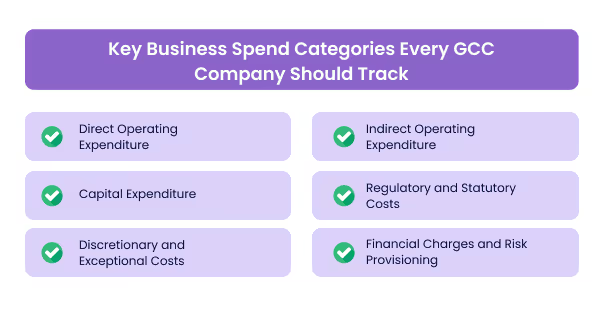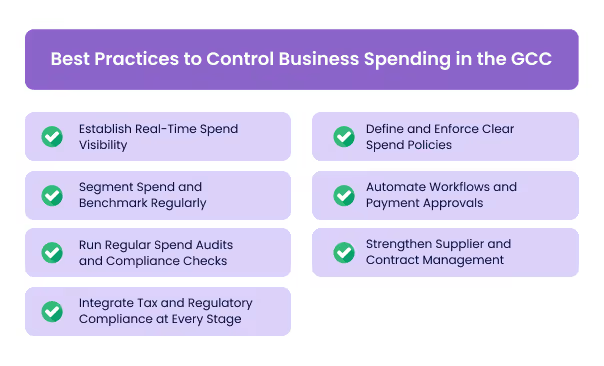By effectively managing overall spending, businesses can protect profit margins and sustain growth, particularly as operating costs across the Middle East intensify. Business travel expenditure in the region reached $ 18.1 billion (AED 66.45 billion) and is projected to increase by 6.1% in 2025, outpacing global recovery and highlighting the rise in operational outlays.
Corporate cost structures are under pressure, with external supplier spending alone comprising up to 80% of a company's total outgoings in certain sectors.
Transparent spend controls enhance decision-making, improve forecast accuracy, and insulate firms against compliance risk, vital in regimes requiring adherence to VAT, Zakat, and evolving tax laws across the GCC.
This blog explains simple methods to manage overall spending effectively. It shares practical tips, regional compliance advice, and strategies that help keep costs under control and avoid legal risks.
Key Takeaways
- Strong spend management directly improves profitability, ensures compliance, and maintains strategic agility.
- External supplier costs can make up 80% of total business outflows, making spend visibility and digital controls mission-critical.
- Embedding transparent policies, real-time tracking, and cross-departmental accountability minimises waste, duplication, and risk of regulatory penalties.
- Technology adoption, like spend management platforms, delivers measurable ROI through automated auditing, analytics, and streamlined approval workflows.
- Finance leaders must drive a cost-conscious culture, enforce clear policies, and run regular audits for long-term resilience.
What Is Overall Business Spending?
"Overall spending" refers to the totality of an organisation's financial outflows, including direct costs (procurement, salaries), indirect costs (utilities, IT infrastructure), and regulatory obligations (VAT and corporate tax).
The scope of managing overall spending is designed to enhance financial stability and reduce unnecessary costs by providing comprehensive visibility and control across all expense categories.
But don’t confuse spend management with expense management.
While often used interchangeably, spend management and expense management represent distinct concepts crucial for effective corporate finance. Expense management primarily focuses on tracking and controlling employee-incurred costs such as travel, entertainment, and small procurements.
In contrast, spend management adopts a strategic scope. It encompasses all organisational outflows, including procurement contracts, supplier payments, capital investments, and regulatory obligations, and integrates data across departments to enable proactive control and optimisation of overall financial resources.
To truly manage overall spending and compliance effectiveness, leaders must break down spending into its critical components and assess each with precision. The next section details how segmenting these categories unlocks targeted savings and sharper regulatory alignment.
Key Business Spend Categories Every GCC Company Should Track

Business spending is best managed by separating expenditures into granular, policy-aligned categories. This allows control, sharper benchmarking, and actionable reporting that meets the demands of complex local regulatory frameworks.
Business spending is segmented into the following categories:
1. Direct Operating Expenditure (OPEX):
- Covers essential daily operational costs: procurement of raw materials, inventory, payroll, logistics, and direct supplier payments.
- Represents 60–80% of total spend in procurement-heavy sectors such as construction, energy, and logistics.
- Subject to VAT liabilities: 5% in the UAE, 15% in Saudi Arabia (2025).
- Requires compliance with e-invoicing and digital reporting mandates issued by authorities like ZATCA as of April 2025.
2. Indirect Operating Expenditure:
- Includes non-production related costs: consultancy, IT support, marketing, administrative services, and insurance.
- The growth is increasing due to regional digitalisation initiatives, especially Saudi Vision 2030.
- Significant IT investments in cloud computing, data governance, and digital infrastructure are ongoing, with Saudi Arabia investing billions by 2025.
3. Capital Expenditure (CAPEX):
- Encompasses long-term strategic investments in fixed assets such as real estate, infrastructure, machinery, and digital transformation projects.
- Directly tied to government initiatives like Saudi Vision 2030 and UAE digitalisation strategies.
- Focuses on sectors including healthcare, smart cities, and AI logistics, all receiving major fiscal support.
4. Regulatory and Statutory Costs:
- Constitutes mandatory contributions: VAT, Zakat, corporate tax, customs duties, municipal levies, and sector-specific fees.
- VAT is set at 5% in UAE and 15% in Saudi Arabia, with strict compliance and reporting requirements under ZATCA.
- Zakat levy applies at approximately 2.58% on zakatable assets for Saudi/GCC entities.
- Corporate income tax at 20% applies to foreign/mixed ownership entities, requiring accurate cost allocation and digital tax filings.
- Enforcement includes robust e-invoicing frameworks and penalties for non-compliance.
5. Discretionary and Exceptional Costs:
- Comprise variable, often irregular expenses: business travel, training, mergers & acquisitions, restructuring costs.
- Middle East business travel spend was $18.1 billion in 2024, with an expected CAGR of 6.1% through 2025, indicating significant cost volatility.
- Necessitates close monitoring for budget accuracy and spend optimisation.
6. Financial Charges and Risk Provisioning:
- Covers interest on loans, currency hedging costs, insurance premiums, and contingency reserves.
- Adoption of advanced treasury management systems to improve liquidity management, automate risk reporting, and optimise cross-border cash flow.
- Critical to manage exposure given regional market volatility, interest rate fluctuations, and complex intra-GCC and international transactions.
Now that you know the types of business spending, let's have a look at the importance of managing business spending.
Why Managing Spending Matters
Effective control of overall spending enables Middle Eastern enterprises to optimise cash flow, reinforce compliance with VAT, Zakat, and corporate tax regulations, and safeguard profitability amid inflationary pressures and supply chain volatility.
Here are the importance of managing overall spending:
- Protects Profit Margins: Rigorous spend management curtails waste, prevents duplication, and maintains cost discipline critical in sectors facing rising raw material and service costs.
- Ensures Regulatory Compliance: Accurate tracking and allocation help avoid VAT, Zakat, and corporate tax penalties, which can be significant in cost and reputation terms.
- Improves Liquidity and Cash Flow: Controlling outflows enables firms to maintain healthy working capital, essential for funding strategic initiatives and responding to market disruptions.
- Enhances Data-Driven Decision-Making: Detailed spend visibility supports predictive budgeting and scenario planning, empowering CFOs to act proactively rather than reactively.
- Supports Long-Term Strategic Goals: Aligning spend controls with corporate visions like Saudi Vision 2030 or UAE digitalisation ensures investments are purposeful and returns are maximised.
General directives are insufficient; modern spend management demands actionable best practices backed by technology, regular oversight, and strict policy adherence.
Best Practices to Control Business Spending in the GCC

By institutionalising targeted best practices, finance leaders go beyond surface-level controls, achieving both immediate savings and the strong financial agility required to compete in an increasingly regulated, tech-based business environment.
Below are some proven best practices that provide cost advantage, ensure compliance, and give long-term value:
1. Establish Real-Time Spend Visibility
- Implement integrated spend management solutions that provide unified dashboards for all expenditure streams, procurement, accounts payable, and employee reimbursements.
- Systems should be ZATCA-compliant in Saudi Arabia, supporting mandatory e-invoicing and generating instant VAT/GCC tax breakdowns for every transaction.
- Enable granular drill-downs by department, project, or supplier, with real-time alerts for threshold breaches or irregular patterns.
2. Define and Enforce Clear Spend Policies
- Develop digital policies specifying approval matrix, purchase thresholds, and spend authorisation at each managerial level. Mandate that no procurement, contract signing, or expense approval occurs outside this framework.
- Update policies to reflect changing statutory requirements, such as UAE Corporate Tax, annual Zakat filing, and sector-specific regulations in healthcare, F&B, or logistics.
- Disseminate policies using automated workflow integrations and mandatory e-learning modules for all stakeholders, including finance, HR, procurement, and project leads.
3. Segment Spend and Benchmark Regularly
- Use expense classification modules to segment OPEX, CAPEX, regulatory, indirect, and discretionary spend in alignment with local chart of accounts and GCC reporting standards.
- Integrate external benchmarking tools to compare internal spend ratios, unit costs, and contract pricing against peers in similar MENA industries.
- Use variance analytics to systematically flag overspending, underutilisation, or outlier departments quarterly.
4. Automate Workflows and Payment Approvals
- Deploy end-to-end procure-to-pay (P2P) workflow automation, enabling digital requisition, automated purchase order creation, multi-layer digital approvals, and three-way invoice matching.

- Link automated payment releases to supplier performance data, contract milestones, and real-time VAT coding, ensuring accuracy and eliminating payment duplication or unauthorised disbursement.
- Maintain audit trails with immutable digital records for every transaction, meeting standards for ZATCA, FTA (UAE), and sector audits.
5. Run Regular Spend Audits and Compliance Checks
- Establish audit cycles at a minimum of quarterly, triggered by value or transaction volume, with focused review on large supplier payments, travel, consulting, and advertising.
- Use transaction mining and AI-based anomaly detection to identify duplicate payments, fraud, or misclassified VAT.
- Document audit outcomes and feed recommendations directly into policy improvement and continuous training loops.
6. Strengthen Supplier and Contract Management
- Centralise supplier data and contract warehouses, enforcing KYC, compliance status (ZATCA, FTA VAT registration), and regular performance reviews.
- Use analytics to identify supplier consolidation opportunities, trigger bulk negotiation, and enforce renegotiation on low-performing or non-compliant vendors.
- Require digitised contract lifecycle management, automatically flagging renewals, expiry dates, and compliance breaches.
7. Integrate Tax and Regulatory Compliance at Every Stage
- Embed dynamic VAT, Zakat, and corporate tax codes into procurement and payment modules, ensuring every invoice/PO is automatically validated for statutory compliance pre-payment.
- Automate updates on GCC-wide regulatory shifts within enterprise systems, deploying real-time alerts to affected departments.
- Pair compliance automation with regular external reviews, using Big Four advisory or specialised local compliance consultants, to mitigate the risk of ever-tightening regulatory scrutiny and penalty exposure.
Even with a strong spend management framework, businesses can encounter complex challenges undermining cost control and compliance efforts. Let’s have a look at some of those challenges.
Common Spending Challenges Faced by GCC Businesses (and How to Fix Them)
Achieving and sustaining effective spend management in the UAE is complicated by several interlinked factors. Overcoming these challenges requires a unified, technology-driven approach: centralising spend data, embracing best-in-class ERP and spend platforms, and embedding compliance automation.
Here are key challenges with their actionable strategies:
1. Fragmented Spend Visibility and Data Silos
Disparate systems and unintegrated data restrict oversight and regulatory reporting, impeding anomaly detection and compliance with mandatory digital reporting.
Solution: Implement a unified, cloud-based ERP and spend management solution centrally integrating procurement, payables, and statutory outflows. Ensure compliance by configuring for e-invoicing, and activate real-time dashboards with department-wise breakdowns, budget tracking, and automated alerts for irregularities.
2. Evolving and Complex Compliance Environment
Frequent regulatory changes burden policy updates and risk inadvertent non-compliance, especially with digital tax requirements and cross-border transactions.
Solution: Automate compliance checks within all spend and payment workflows. Integrate real-time regulatory update feeds, and link them directly to approval matrices and invoice coding, ensuring policy, forms, and tax rates update instantly for all affected users and territories.
3. Manual and Decentralised Processes
Paper- or Excel-based approvals and unstandardised procurement cycles cause duplication, errors, slow validation, audit weaknesses, and missed negotiation opportunities.
Solution: Shift to end-to-end digital workflow automation. Use standardised P2P processes with digital requisition, automatic PO generation, and three-way matching for invoices.
4. Supplier Management and Contractual Complexity
Large vendor bases, incomplete compliance checks, and legacy contracts without digital controls heighten cost, compliance, and operational risk.
Solution: Centralise all supplier data in a digital contract management system with automatic KYC and regulatory validations on onboarding. Deploy analytics to identify opportunities for vendor consolidation, trigger renegotiations, and monitor performance against SLAs.
5. Internal Resistance and Change Management Barriers
Poor adoption of cost controls, resistance to technology, and lack of training undermine policy enforcement and dilute compliance.
Solution: Launch a comprehensive change management programme. Mandate quarterly training tied to staff KPIs, provide role-based dashboards, and link cost accountability to incentive structures.
Using a dedicated spend management solution like Alaan can transform how firms manage overall spending, especially where digitisation and regional fiscal mandates converge.
How Alaan Can Help You Manage Overall Spending
Alaan is a fintech platform tailored to the Middle Eastern business environment, offering an integrated spend management solution designed to streamline expense oversight, procurement payments, and regulatory compliance.
Key features of Alaan include:
- Real-Time Spend Visibility: Consolidates all company spend into a central dashboard with detailed categorisation, enabling finance teams to monitor cash flow and expense patterns instantly.
- Corporate Card Integration: Provides virtual and physical corporate cards with embedded spend controls and automated reconciliation, reducing manual errors and optimising cash management.
- Regulatory Compliance Automation: Automatically applies relevant VAT and tax codes, supports e-invoicing compliance (ZATCA and UAE FTA standards), and generates audit-ready reports to minimise risk of fiscal penalties.
- Digital Procurement and Payment Workflows: Facilitates approval hierarchies, supplier onboarding with KYC compliance, and seamless payment processing, accelerating procurement and improving supplier relationships.
- Advanced Analytics and Reporting: Offers customised insights into category spend, department-wise budgets, and forecast variances critical for proactive decision-making aligned with business strategy.
For finance leaders aiming to modernise spend controls while ensuring statutory compliance, implementing Alaan presents a compelling step toward operational excellence and financial agility.
Schedule a demo today to gain immediate transparency on spend patterns and compliance status.
Conclusion
Managing overall spending is no longer just a finance task—it’s a business-wide priority. For companies across the GCC, rising costs, increasing regulatory pressure, and rapid digitalisation demand a proactive approach to spend control.
With the right systems in place, finance leaders can shift from reactive oversight to strategic control—boosting efficiency, reducing risk, and ensuring audit readiness at every level.
At Alaan, we believe spend management should empower—not burden—finance teams. That’s why we’ve built a platform tailored for businesses across the GCC to gain full control over spending, stay compliant with evolving tax regulations, and unlock real-time insights without manual work.
Ready to see how it works?
Schedule a free demo and let us show you how Alaan can help your team save time, cut waste, and scale with confidence.
Frequently Asked Questions (FAQs)
1. What are the most common causes of spend leakage in Middle East businesses?
Spend leakage often results from unauthorised purchases, lack of policy enforcement, and poor supplier contract management, leading to untracked or duplicate expenses.
2. How can businesses ensure spend data integrity for audits in the UAE and Saudi Arabia?
Implement centralised, automated spend management platforms with digital audit trails, ensuring all transactions are accurately categorised and compliant with ZATCA and FTA e-invoicing requirements.
3. What is the impact of delayed supplier payments on compliance and operations?
Late payments may trigger regulatory fines, damage supplier relationships, and disrupt supply chains, increasing costs and risking non-compliance with statutory payment terms.
4. How should businesses handle spend management for cross-border transactions in the GCC?
Standardise workflows that integrate automated VAT coding, currency conversions, and reporting for each jurisdiction, ensuring local compliance and minimising currency risk.
5. What role do early payment discounts play in overall spend optimisation?
Negotiating and capturing early payment discounts directly reduces total procurement costs and improves supplier goodwill, benefiting cash flow and budget performance.
6. How frequently should spend management policies be reviewed in rapidly evolving regulatory contexts?
Policies should be reviewed at least semi-annually or immediately following significant regulatory updates to ensure continuous compliance and alignment with business objectives.


.avif)







%201.avif)